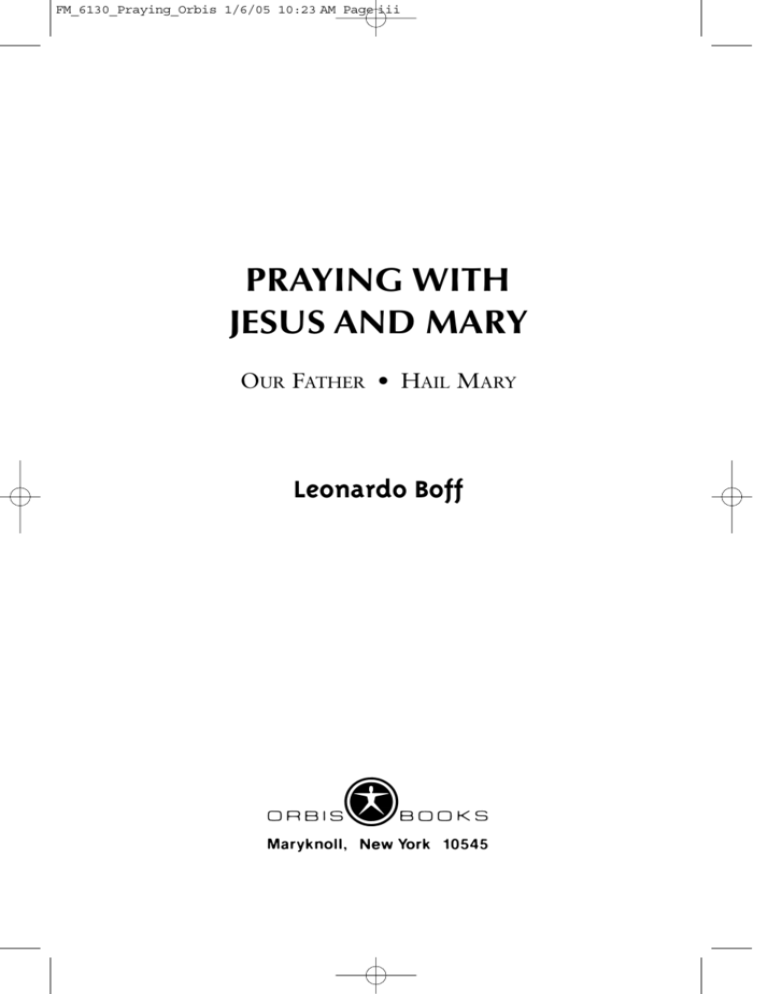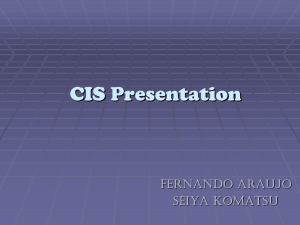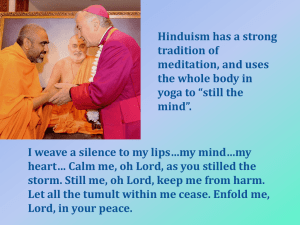
FM_6130_Praying_Orbis 1/6/05 10:23 AM Page iii
PRAYING WITH
JESUS AND MARY
OUR FATHER • HAIL MARY
Leonardo Boff
FM_6130_Praying_Orbis 1/6/05 10:23 AM Page iv
Founded in 1970, Orbis Books endeavors to publish works that
enlighten the mind, nourish the spirit, and challenge the conscience.
The publishing arm of the Maryknoll Fathers and Brothers, Orbis seeks
to explore the global dimensions of the Christian faith and mission, to
invite dialogue with diverse cultures and religious traditions, and to
serve the cause of reconciliation and peace. The books published reflect
the views of their authors and do not represent the official position of
the Maryknoll Society. To learn more about Maryknoll and Orbis
Books, please visit our website at www.maryknoll.org.
This book combines two works by Leonardo Boff: O pai-nossa: a
oração da libertação integral, copyright © 1979 by Editora Vozes
Ltda. Rua Freu Luís, 100, 25.600 Petrópolis RJ, Brazil, first published
in English as The Lord’s Prayer: The Prayer of Integral Liberation,
copyright © 1983 by Orbis Books, Maryknoll, NY 10545; and A
Ave-Maria: O feminine e o Espírito Santo, copyright © 1980 by
Editora Vozes Ltda., © 2003 by Animus/Anima Produçoes.
English translation copyright © 1983, 2005 by Orbis Books
Published by Orbis Books, Maryknoll, NY 10545-0308.
All rights reserved.
No part of this publication may be reproduced or transmitted in
any form or by any means, electronic or mechanical, including
photocopying, recording, or any information storage or retrieval
system, without prior permission in writing from the publisher.
Queries regarding rights and permissions should be addressed to:
Orbis Books, P.O. Box 308, Maryknoll, NY 10545-0308.
Manufactured in the United States of America
Library of Congress Cataloging-in-Publication Data
Boff, Leonardo.
Praying with Jesus and Mary : Our Father, hail Mary / Leonardo
Boff.
p. cm.
Includes bibliographical references.
ISBN 1-57075-575-2 (pbk.)
1. Lord’s prayer. 2. Ave Maria. I. Title.
BV230.B634 2005
226.9´606—dc22
2004061729
ch01_6130_Praying_Orbis_P1 1/6/05 10:24 AM Page 3
1
The Prayer of Integral Liberation
A spiritual teacher once said:
“If I have no love or I fail to act justly, then inevitably I separate myself from you, O my God, and my worship is nothing but
idolatry.
“To believe in you, I must believe in love and believe in justice, and it is much more important to believe in these things
than to pronounce your name.
“Without love and justice it is impossible for anyone, at any
time, to be in contact with you.
“But those who take love and justice as their guide are on the
true path that leads to you.”
The incarnation is more than just one of the central mysteries
of the Christian faith. It also opens the way to a new understanding of reality: the incarnation signifies the mutual presence of the
divine and the human, the compenetration of the historical and
the eternal. Each of these dimensions maintains its own identity,
and at the same time it enters into the composition of another, a
new, reality.
Jesus Christ, who was man and God at the same time, constituted the reality of a paradigmatic and supreme incarnation.
To understand this singular novelty, it is not enough to use the
categories of transcendence and immanence—the two key factors of Greek thought. These two categories capture the element
of difference between the two dimensions—the human is not divine and the divine is not human—but they do not succeed in
3
ch01_6130_Praying_Orbis_P1 1/6/05 10:24 AM Page 4
4
THE LORD’S PRAYER
explaining their coexistence and joint inclusion in one and the
same being.
We must have recourse to another category—that of transparency. This category undertakes to manifest the presence of transcendence within immanence, making each transparent to the
other. It is in the human that the divine finds realization; the divine transfigures the human. What is most important is the fact
that a new reality has appeared, a reality that is unified but in tension, because it is composed of two “others” of differing nature.1
THE LAW OF INCARNATION
Christianity can be understood as a prolongation of God’s incarnation process. Just as the Son took everything upon himself
in order to liberate everything, so the Christian faith seeks to become incarnate in everything in order to transfigure everything.
It is in this sense that we say: everything belongs in some way to
the kingdom of God, because everything is objectively connected
with God and is called to belong to the reality of God’s kingdom. Thus the Christian faith is not just interested in those realities described as spiritual and supernatural. It also places a value
on the material and the historical. All of these pertain to one and
the same schema of incarnation by which the divine penetrates
the human and the human enters into the divine.
Against the background of this understanding, the Christian
community commits itself to the integral liberation of human beings, not just of their spiritual dimension. Even their corporeality
(and here we refer to the economic, social, political, and cultural
infrastructure in their fullest sense) is “called” to absolute realization in God and to become a part of the kingdom of the Father.
As a consequence, the Christian community, especially in recent
years, has committed itself more and more to the liberation of the
oppressed, to those condemned “to remain at the margin of life,
experiencing hunger, chronic illnesses, illiteracy, poverty. . . .”
The church, as Pope Paul VI stated and as was reaffirmed at
Puebla, “has the duty to proclaim the liberation of millions of
human beings, among whom are many of the church’s own children; the duty to help bring this liberation forth in the world, to
ch01_6130_Praying_Orbis_P1 1/6/05 10:24 AM Page 5
The Prayer of Integral Liberation
5
bear witness to it and make sure it is total. None of this is alien
to evangelization” (Puebla 26; Evangelii Nuntiandi [EN] 30).2
The church involves itself in this temporal endeavor because it is
aware that what is temporal is to be penetrated by grace and by
the full reality of the kingdom of God. The temporal is to become
transparent and sacramental. Well has the poet said: “O street
cleaner, as you sweep the streets, you are sweeping the kingdom
of heaven” (D. Marcos Barbosa).
NEITHER THEOLOGISM NOR SECULARISM
Two dangers have been called to our attention by Pope Paul
VI in Evangelii Nuntiandi (1975) and by the bishops at Puebla
(1979). The first is that of religious reductionism (theologism).
It limits the activities of the Christian faith and the church to a
strictly religious sphere—to worship, piety, and doctrine. Pope
Paul VI clearly maintained that “the Church is not willing to restrict its mission only to the religious field and dissociate itself
from man’s temporal problems” (EN 34). The Puebla Conference states this even more bluntly: “Christianity is supposed to
evangelize the whole of human life, including the political dimension. So the Church criticizes those who would restrict the
scope of faith to personal or family life; who would exclude the
professional, economic, social, and political orders as if sin, love,
prayer, and pardon had no relevance in them” (Puebla 515).
What is emphasized here is the need to understand Christianity not as an area of reality (the religious field) but precisely as a
process by which all of reality is incarnated in order to redeem it
and make it a part of the kingdom of God. It is important for the
Christian faith to be genuine and salvific. And it is salvific, and
consequently genuine, when it is in the form of love. And the love
that brings us to the threshold of salvation is not a theory, but a
practice. Only faith that is compatible with the practice of love is
worthy of the name. Its purpose is to integrate the Christian
faith with the other realities of life.
The second danger is that of political reductionism (secularism).
It restricts the relevance of the Christian faith and of the church
to a strictly political area. This would be to reduce the church’s
ch01_6130_Praying_Orbis_P1 1/6/05 10:24 AM Page 6
6
THE LORD’S PRAYER
mission “to the dimensions of a purely temporal project; its aims
would be reduced to a man-centered goal; the salvation of which
it is the messenger would be reduced to material well-being. Its activity, forgetful of all spiritual and religious preoccupation, would
become initiatives of the political or social order” (EN 32; cf.
Puebla 483).
The Christian faith has a dimension that is oriented toward
society, but this dimension does not exhaust it. In its original
meaning, its view is oriented to eternity, and from there it contemplates political activity and informs social action. From a point
within history it proclaims and calls attention to a salvation that
history itself cannot bring forth, a liberation so complete that it
creates perfect freedom—and this has already begun here on
earth.
These two reductionisms disrupt the transparency and unity of
the incarnation process. The essential thing is to overcome this
antithetical dualism and to establish a proper integration and an
adequate way of relating human liberation to salvation in Jesus
Christ (see EN 35; Puebla 485): “The Church strives always to
insert the Christian struggle for liberation in the universal plan
of salvation which it proclaims” (EN 38; cf. Puebla 483).3
The postulate of history and of the Christian faith is one of
seeking a complete liberation, one that embraces every dimension
of human life: physical and spiritual, personal and collective, historical and transcendent. No reductionism, whether it be spiritual
or material in orientation, will do justice to the unity of humankind, to the unique design of the Creator, and to the central reality
of Jesus’ proclamation of the kingdom of God, which embraces
creation as a whole.
THE LORD’S PRAYER IN ITS ARTICULATION
In the Lord’s Prayer we encounter in a practical way the correct relationship between God and humankind, between heaven
and earth, between the religious and the political, while maintaining unity throughout. The first part speaks on God’s behalf:
the Father, keeping his name holy, his kingdom, his holy will. The
ch01_6130_Praying_Orbis_P1 1/6/05 10:24 AM Page 7
The Prayer of Integral Liberation
7
second part is concerned with human interests: our daily bread,
forgiveness, ever-present temptation, ever-threatening evil.
The two parts constitute the one prayer of Jesus. God is not just
interested in what belongs to him: his name, his kingdom, his divine will. He is also concerned about our affairs: bread, forgiveness, temptation, evil. Likewise we are not just concerned with
what is vital to us: bread, forgiveness, temptation, evil. We are
also open to the Father’s concerns: sanctification of God’s name,
the coming of God’s kingdom, the realization of God’s will.
In the prayer of Jesus, God’s concerns are not alien to those of
human beings, and their concerns are not foreign to his. The impulse by which humankind is directed upward to heaven and supplicates God rebounds back to the earth and exerts its influence
on earthly concerns. It is all one movement, enveloped in a profound unity. It is precisely this mutual involvement that generates
the transparency to be found in the Lord’s Prayer.
What God unifies—our preoccupation with him and our preoccupation with our own needs—let no one put asunder. God
should never be betrayed for the sake of earthly needs; at the same
time, it will never be legitimate to anathematize the limitations
of our earthly existence because of the grandeur one finds in the
reality of God. The two together constitute the material of prayer,
supplication and praise. This is why we regard the Lord’s Prayer
as the prayer of integral liberation.
The reality encompassed in the Lord’s Prayer is not a pretty
picture but one of heavy conflict. Here the kingdom of God confronts the kingdom of Satan. The Father is near (he is our Father)
but he is also remote (in heaven). Blasphemies are spoken in this
world, which imposes on us the duty to sanctify God’s name. The
world is ruled by all sorts of evils that exacerbate our longing for
the coming of God’s kingdom, which is one of justice, love, and
peace. The will of God is being violated, and we must give it concrete expression in our conduct. We pray for daily bread because
there are many who do not have it. We ask that God forgive us
our violations of fellowship, so that we can forgive those who have
offended us. We pray for strength in temptations, because otherwise we would fail miserably. We cry out to be set free from evil,
because otherwise we would turn our backs on the faith forever.
ch01_6130_Praying_Orbis_P1 1/6/05 10:24 AM Page 8
8
THE LORD’S PRAYER
And in the midst of all this conflict the Lord’s Prayer preserves
an aura of joyful confidence and serene commitment, inasmuch
as all of this is integrated into our encounter with the Father.
If we observe closely, we find that the Lord’s Prayer deals with
the major themes of the personal and social existence of all humankind in every era. There is no reference here to the church,
not even a word about Jesus, his death, or his resurrection. God
is at the center of the stage, where the other center—that of humanity and its needs—converges. Here we have what is essential.
All the rest is corollary or commentary; it is appended to the essential. “Ask great things of God, and he will give you the small
ones as well”: this is a saying attributed to Jesus by a non-New
Testament source, Clement of Alexandria (140–211 A.D.).4 An important lesson has been preserved for us here: we must open our
minds beyond our self-imposed horizons and widen our hearts
beyond our self-imposed limits. Then we will find what is essential, so well translated by Jesus into the prayer that he taught us,
the Lord’s Prayer.
The order in which the petitions appear is not arbitrary. They
begin with God and only then pass to us. It is in starting with
God, from his vantage point, that we become concerned with
our own needs. And in the midst of our sufferings we must be
concerned with God. Suffering in heaven is connected with suffering on earth.
Any genuine liberation, from the Christian standpoint, starts
with a deep encounter with God that moves us to committed action. It is here that we hear his voice as he tells us continually:
Go! And, at the same time, any radical commitment to justice
and love of others moves us back to God as the true Justice and
supreme Love. Here also we hear his voice as he tells us: Come!
Any liberation process that does not succeed in identifying the
prime mover of every activity, which is God, does not achieve
its purpose and does not reach completion. It is in the Lord’s
Prayer that we encounter this felicitous relationship. There are
good reasons why the essence of Jesus’ message—the Lord’s
Prayer—was not formulated as a doctrinal statement but as a
prayer.
Our theological and spiritual meditation on the Lord’s Prayer
seeks to examine and integrate three levels of interpretation. The
ch01_6130_Praying_Orbis_P1 1/6/05 10:24 AM Page 9
The Prayer of Integral Liberation
9
first level is that of the historical Jesus: What meaning did Jesus
himself attribute to the words he spoke? What meaning does his
prayer have? From earliest times the Lord’s Prayer has been a kind
of summary of the message of Jesus. In the form of a prayer it
expresses his most radical and profound experience. At this first
level we must take care to make use of the most certain findings
of exegesis.
The second level of interpretation grows out of an examination
of the theology of the apostolic church. The Lord’s Prayer has
been incorporated into the Gospels of Matthew and Luke in the
context of a community prayer. Christians prayed the Lord’s
Prayer at all their meetings. They assigned a particular meaning
to the words in relation to their own life context. It is reflected in
the way they edited the gospels and in the theological accents that
they imparted to the words of Jesus. Here we must seek to understand the Lord’s Prayer in the light of the general theology of
the New Testament.
Finally, we will seek to interpret the Lord’s Prayer as we hear
it in our own day. When we recite the Lord’s Prayer today, we inevitably read into it the concerns of our own faith community.
Today’s Christian community seeks to live and reflect upon the
Christian faith in its liberating dimension, in view of the enormous
social inequities to which our brothers and sisters are subject.
We experience the Lord’s Prayer as the perfect prayer of integral
liberation.
There are classical commentaries on the Lord’s Prayer by the
church fathers, such as those by Tertullian (c. 160–225), St. Cyprian
(200–258), Origen (185–253), St. Cyril of Jerusalem (died 386),
St. Gregory of Nyssa (died 394), St. Ambrose of Milan (339–397),
Theodore of Mopsuestia (died 428), St. Augustine (354–430), and
St. Francis of Assisi (1181–1226).5 When we study them, we realize that their authors attach to their commentary on the Lord’s
Prayer a commentary on their own life, complete with the aspirations and anxieties typical of their times.
There is nothing more natural: to read means to reread. If we
are to gain any meaning out of the past, we must energize it in
terms of the present.
With an awareness of these processes, which are part of any
learning experience, we accept the goal and the limitations of our
ch01_6130_Praying_Orbis_P1 1/6/05 10:24 AM Page 10
10
THE LORD’S PRAYER
own commentary, located as it is within this situation of our own,
so characterized by oppression and by the longing for total liberation. Reciting the Lord’s Prayer means evoking the words of
his day and recalling the realities of our own. And, surprisingly,
we discover ourselves to be the neighbors and contemporaries of
Jesus Christ.










